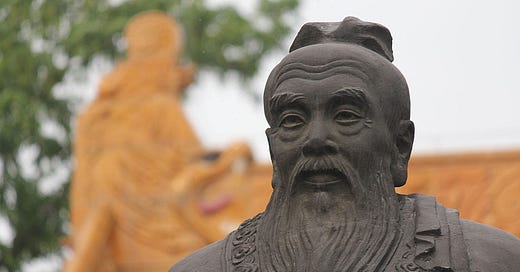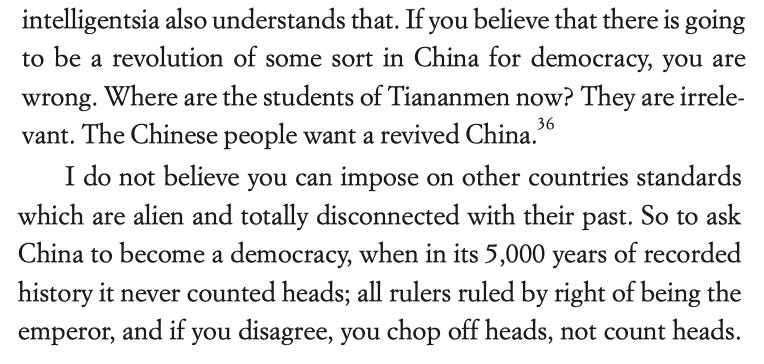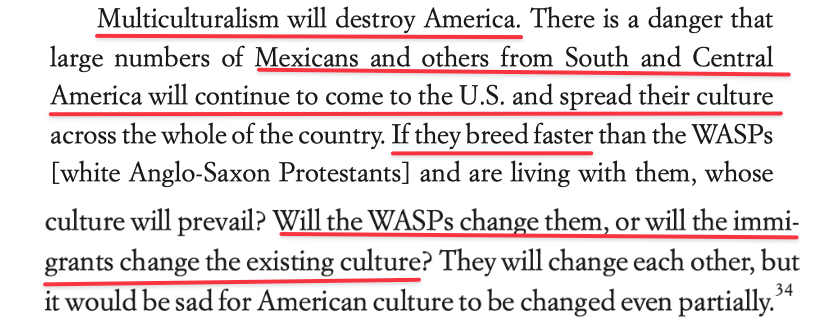
T2B15: Xiden 2 - Confucian Capitalism
Newslet
The infamous term ‘POC,’ People of Color, might be a political oxymoron, in that it doesn’t describe a group of people who share anything besides not being white. For example, California voted overwhelmingly for Biden and yet equally emphatically defeated Proposition 16, which (somewhat confusingly) was a proposition designed to end the ban on affirmative action. Asian (and increasingly Hispanic) communities are in conflict with African Americans (and other Hispanic) communities on the value of affirmative action in higher education.
However, in a twist upon the twist, Proposition 17 (voting rights for previously incarcerated people) was passed overwhelmingly, which, given the racist politics of incarceration, is clearly to the benefit of African Americans. Moral, economic and racial interests are all intertwined in POC politics.
Confucian Capitalism
First, a hat-tip to Cliden: John Kerry has been appointed climate czar, a cabinet level appointment with the National Security Council. Kerry himself was a presidential candidate in 2004, a long term Massachusetts senator and a Secretary of State under Obama. Which means he has the heft needed to start making climate deals with China (you knew there was going to be a link to Xiden didn’t you?). Climate may become a bigger part of the US trade negotiations and if combined with a Green New Deal (or something similar without that name, which is a lightning rod on the right) might signal a massive shift in the US economy.
Let’s first ask how China got to re-embrace Master Kong. In my reading, it was born out of failure rather than success. The two prongs of that fork:
The failure of the Maoist revolutionary state - from Deng onward, the CCP has considered the Maoist era as one of chaos and turbulence, certainly not the harmonious society that Xi talks about today. Exporting revolution was no longer state policy.
The failure of the communist economy with the end of the Soviet Union. Once the Soviet Union collapsed, there was no alternative left to capitalism as Branko Milanovic has argued persuasively.
So the CCP has a branding problem: how do you retain the legitimacy of a one-party state while shifting the economy to a mode of production that’s famously cyclic and prone to bubbles and busts. Further, how to do so in a globalizing world in which knowledge industries and cognitive capitalism are increasingly decisive?
In case you were wondering whether China is capitalist at all, seeing as it’s run by the Communist Party

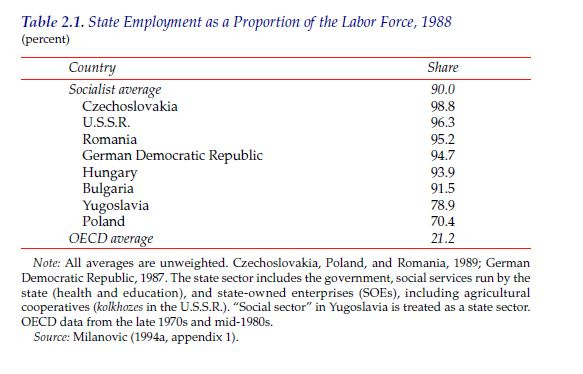
How about embracing a philosophical system that’s the most important tradition in Chinese history:
a tradition that emphasizes hard work, personal virtue and filial piety
a tradition that affirms material production but tempers it with personal virtue
a tradition that places great value on scholarship and knowledge
In other words, Confucian Capitalism strikes me as the perfect Chinese counterpart to the Weberian ‘Protestant Ethic’ that’s the supposed backbone of Northern European-American capitalism.
China wasn’t the first Confucian Capitalist state - that would be Singapore, and while I don’t like being caned for spitting on the sidewalk (not that I spit on sidewalks) the Singapore model is considered such a universal success that it’s a good model to emulate if you want to create an authoritarian, prosperous society. Some choice quotes from the Godfather of Singaporean success:
Investment in education, but of the practical kind that won’t turn people against the state. That state faces plenty of problems of its own:
I had to read that passage a couple of times. He’s not saying ‘the rule of the emperor’ is the problem, but its exact opposite - that in China, the rule of the law is the rule of the emperor. Explains Xi’s increasing emperorization.
I would take these view with a grain of salt. Yew’s views reflect his personal commitment to Confucian capitalism and he was a man of the past, not the future. Still, there’s so much overlap between Yew and what I have read about the Chinese leadership and portions of the intelligentsia that we have to take them seriously.
Some of these views are dogwhistle politics:
and some are outright racist
This could just be the opinions of an old man who hasn’t been told he’s wrong in a long time. But, unfortunately, LKY’s ideas seem to be echoed by the Chinese liberal intelligentsia (let alone their conservatives).
In today’s America, being a "centrist" who is both outraged at the murder of ordinary Black citizens and also finds political correctness frightening is actually quite awkward. At this moment of division, when both sides are already fighting mad, neither side has an empathetic understanding of the other. It’s easy to say that solidarity is important to a country, but BLM activists might well answer: What do we base this solidarity on? Liberal discourse is nothing but fake universalism. This is why the movement’s slogan is “Black lives matter” and not “all lives matter.”
— from Xu Jilin, et. al., "Black Lives Matter." though also see Lin Yao, "I Beg to Differ" for a rebuttal.
I wouldn’t be surprise if Xi held similar views, though I have no way of knowing what he thinks. The star of vigorous protest politics has never been this low in Asia, India included. East Asia has handled the COVID crisis better than most other parts of the world, and China has done better than the United States. Then there’s the chaos of the election and the transition.
The backdrop to Xiden might well be a China that’s at once wary of American power and feeling like its Confucian capitalist state is a fundamentally better solution to the problem of political life than liberal democracy.
Note that China didn’t acknowledge Biden’s victory until November 13th. Modi did so (personally, unlike the formal acknowledgement by the Chinese foreign ministry) on November 7th.

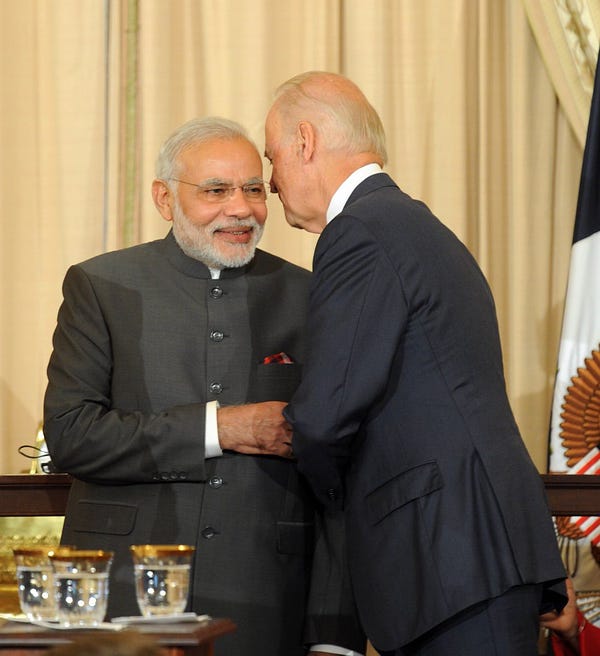
Every part of this unfolding relationship suggests a cautious and strategic approach by China. They want to compete with America but get into direct conflict. They don’t want to become American but aren’t ready to turn the world Confucian either.
Biden’s challenges are different. He has a fractured mandate and in order to appear as the candidate of national unity, he will be pressured to resume a policy of ‘American Exceptionalism,’ a policy that both Obama and Clinton (H as well as W) supported but that’s best captured in Gore Vidal’s famous slogan:
Here Trump might have gotten something right precisely because he considers all relationships to be transactional. According to this interesting take on Trump by Branko:
In the America First policy, US will always, because of its size and importance, punch more than others but it will have no desire or illusion that it has to rule others or tell them how they should order their internal affairs. It will behave transactionally which is indeed a policy that makes war much less likely. Interests can be negotiated, ideologies cannot.
I can’t state how amazing it is that a Republican president didn’t start a new war or escalate an old one. The Soviet Union was like the US in that it too wanted its way of life to be everyone’s way of life. China seems to be OK admitting there are genuinely plural ways of living, a proposition that was the historical norm but has never been tested under globalization with its implicit belief in American exceptionalism.

